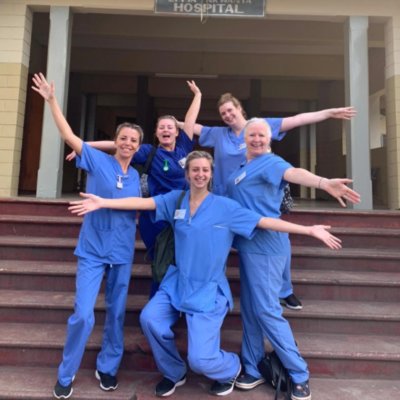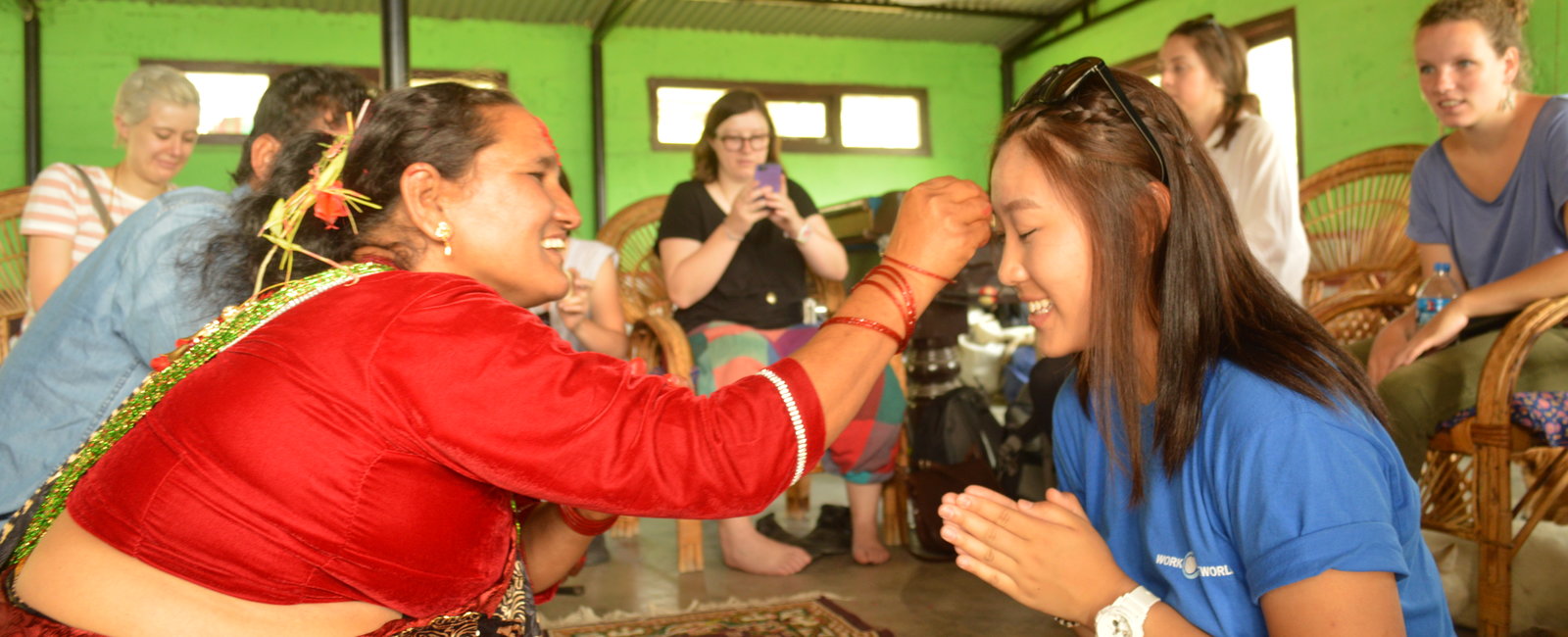University of Portsmouth 2020
Kathryn is a third-year Adult Nursing student at Portsmouth University. She spent two weeks in a Ghanaian hospital to see the differences between the delivery of care in Ghana and the UK, and below, she describes her experience.
The Diary of a Student Nurse in Ghana
In January, Daisy (my lovely university buddy) and I will fly out to Takoradi in Ghana, where we will undertake a nursing placement in one of the local hospitals. I will be spending one week in A&E and one week in paediatrics. Being the emotional wreck I am, I fully expect to find this a challenging but rewarding experience. We have been pre-warned by Work the World that we will encounter situations that we would never experience here in the UK and that people will die of what we would class easily treatable conditions.
It was the night before Ghana when, all through the house, not a creature was stirring, not even joking—I am wide awake. My cases are packed, and I’m sure I have forgotten something significant. I have been out to the shops three times since yesterday; the last time was for Marmite. I feel better knowing I have that, at least. Now for SLEEP… hope! Next time I update you, I should be there.
We’re in Ghana
On arrival last night, we were met by a very enthusiastic Work the World staff member. We left the big city of Accra and drove through deserted roads and little pop up villages (which is precisely what they look like really, shacks, huts and small buildings built up to form communities) men, women and children standing at the sides of the roads selling anything from bread to cuts of fabric. And yes, they all carry big heavy loads on their heads. Finally, we arrived at the big blue World Work house in Takoradi.
My alarm went off at 6:20 a.m., and I was ready for breakfast at 7. I didn’t sleep well; it is SO hot at night. The plan for today was both the hospital and local area induction.
After another bumpy ride, we arrived at the hospital, a crowd of us walking along like a sea of blue. We visited the different departments and were introduced to the hospital staff. From the minute we walked in, it was pronounced that this would be nothing like home.
The hospital is old and has limited equipment. We were shown the orthopaedic ward, which the nurse invited us to walk through. Privacy does not really exist here. Two of the men we encountered were not orthopaedic patients but had sustained head injuries. She explained that they should be in intensive care, but seeing as they didn’t have one, they would have to stay there. There is no fancy equipment, just a bed and a drip.
Next stop: A&E. There seem to be people everywhere, a lot just hanging about waiting for others. Patients sit outside, lie outside, wait on trolleys outside, and are carried out of a car outside. Inside, the beds are virtually on top of each other.
I have to say the one thing the hospital staff beat us on in Ghana is their uniforms. The nurses wear beautiful green and white fitted dresses, with a band on the sleeve to indicate if they are qualified or which year of training they are in. The head nurses wear pristine white dresses, white socks and white shoes. Every one of them looked like the dresses had been made to measure.
My first day on placement
Today, I was placed alongside Hayley, one of my university friends. Our first stop was the paediatric ward. We arrived at 00 a.m.m to find the ward quiet with only four patients. One was an 8-year-old girl with sickle cell. The nurse explained that she urgently needed a blood transfusion.
They had given her half of what she needed but could not get anymore. To be able to receive blood, a family/friend has to donate the same type back to replace it. The girl was a rare blood typ,e and there was nobody available to donate for herIt doesn’t’t get;t, she will moslikelyIt's. It’s complex to grasp when we think nothing of things like this at home. We take for granted that what we need is readily available when sick.
At around 10:30 am, we moved up to neonatal intensive care (NICU). The hospital has no aircon, so the working conditions are challenging. The nurse watched over a baby boy under 24 hours old. He had a pulse oximeter (measures pulse and oxygen levels) on his foot, and his oxygen levels were dangerously low. He had a make shift CPAP in place administering oxygen, this had been put together using an old water bottle with tubing in.
They do not have the equipment that we do back home. WI wanted to wrap him up and hold him until he peacefully slept. He had been through so much. We left at 3:00 pm, emotionally and physically drained.
Weekend travel
As placement is Monday to Friday, the weekends are free for us to explore Ghana. This morning, we embarked on a journey down to the Cape Coast and then on to Kakum National Park.
We arrived at Cape Coast to visit the Cape Coast castle. This is one of the many castles and forts built along the Gold Coast by European traders. Originally, it was used to trade timber and gold, but by 1653, it was used to harbour slaves for the trans-Atlantic slave trade. We had a guided tour of the castle grounds and heard stories of the living conditions that the slaves endured while being held captive. It is an emotion-evoking tour, and I have to admit I did shed a tear.
So here I am doing something I am entirely uncomfortable with: spending the night in a tree house in the middle of a forest in Kakum National Park. It is as basic as they come. We trekked in with our guide, who laid out mattresses, gave us each a sheet and then said he would be back later to spend the night with us. We each have a mosquito net, which we have tied up and tucked under the mattress. It’s hot, loud with the sounds of nature and quite honestly, a bit scary... mainly at the thought of spiders. We plan to get up at 4:30 am with our guide and set off for a canopy walk to watch the sunrise and hopefully catch all the wild animals before the park opens.
04:19 am – I did not sleep. The alarm is set for 04:30 am. Hurry up - I want everyone to wake up to get going. The canopy walk was terrific; it consists of 7 rope-style bridges, suspended over the treetops at 30m high. I usually don’t like heights, but it was a piece of cake after the night I just had it. We stood at the top of the trees and watched the African sunrise come into place. It was peaceful and beautiful and made the whole night worthwhile.
Week 2
A&E is not A&E as we know it; there is no fancy equipment, and the room is tiny. As you walk in the door, there is a triage area, which translates to a couple of chairs and a table. Patients present themselves directly to this point where they are triaged immediately. This involves a brief history and a set of observations. Anyone suspected of having anything contagious is put outside on beds/chairs. Blood glucose testing is also done, but the patient must pay 5 Cedis (less than £1). There is an insurance system here in Ghana that costs only £4 for the year. Not everyone takes it out, though, and I don't. Iny treatment unless you pay; sadly,; sadlye cannot afford to pay.

Time to go home
Where have the last two weekbeen?me?
I’ve been wanting to get back to my loved ones and home comforts for weeks and never wanting to leave Ghana life. I am a complete creature of comfort; I hate change and try to avoid venturing too far from what I know.
But I can honestly say Ghana has been my life's most amazing and humbling experience. The things I have seen have made me question what this life is. One thing I have taken from all this is that I want to encourage my children to travel as much as possible. I want them to meet people, experience different cultures, see those less fortunate than us, and realise there's a beautiful world out there. When people say the world is your oyster, it is.
I want to give a shout-out to the lovely people I met at the Work the World house—the doctors, nurses, and physiotherapists. What a trip of a lifetime!
Read more about our Electives in Africa, and you'll find options in Tanzania and beyond.

.jpeg)





